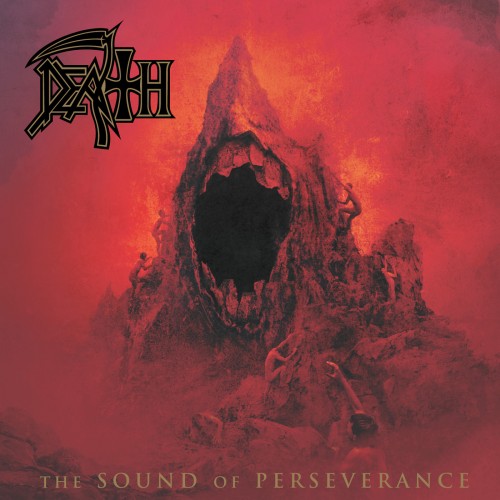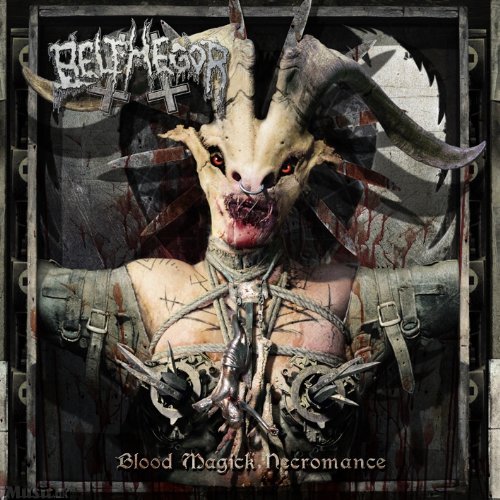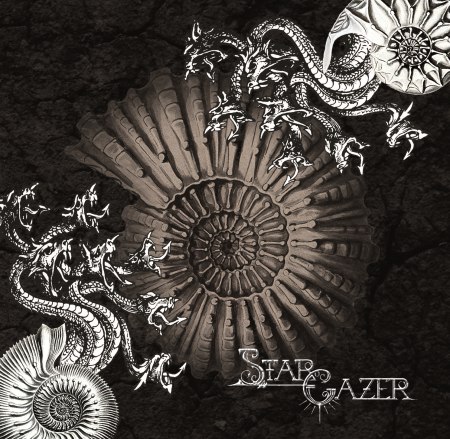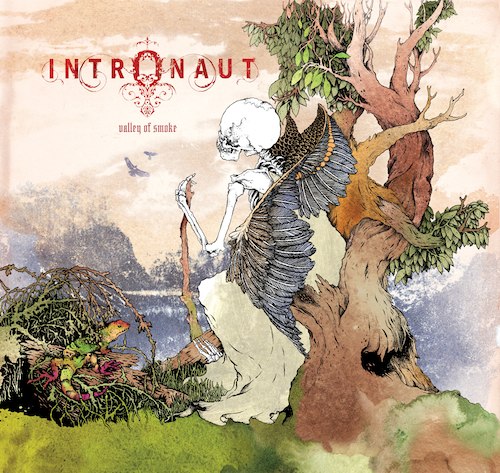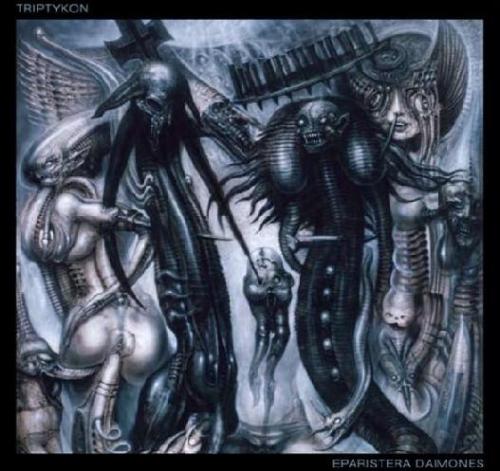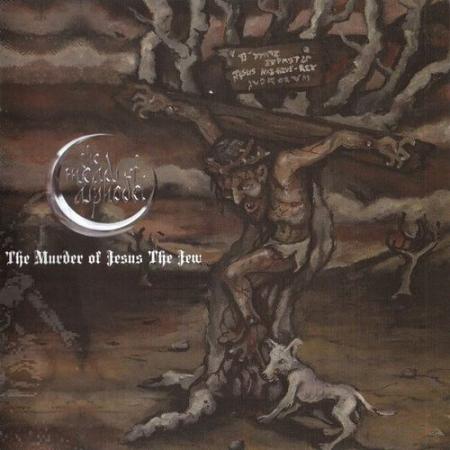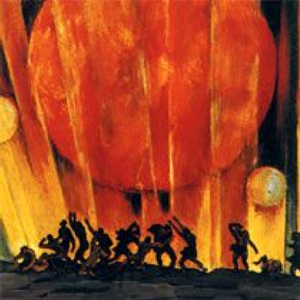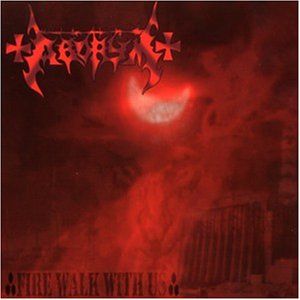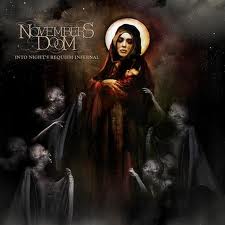Blood Revolt, Indoctrine (2010)

Ruthlessly intense
Indoctrine will almost certainly go down as one of the most realistically frightening extreme metal releases of the year. This album isn’t about praising Satan, or hating Christians, or the myriad unwholesome things one can do with a chainsaw; no, this album attempts to bring the listener inside the motivations of those who commit real-world violence in the service of some form of righteousness. It’s pretty fucking successful, too.
Let’s get the preliminaries out of the way first, though. Blood Revolt is a three-man unit featuring Alan Averill (also known as Nemtheanga, of Irish epic black metallers Primordial) on vocals, C. Ross (of Revenge and Axis of Advance) on guitars and bass, and J. Read (of Revenge, Axis of Advance, and Conqueror) on drums. If that lineup isn’t enough to get you salivating, then I’m not sure there’s much I can do for you here.
Musically speaking, Blood Revolt hews rather closely to the variety of bestial black/death/war metal sounds spat forth by Ross and Read’s former projects, and thus has clear historical roots in the purposeful atavism of early North American black metal (from Canada’s own Blasphemy, Conqueror, and Revenge through America’s Von, Demoncy, and all the other usual suspects). However, the production is magnificently transparent, allowing each and every churning, heaving riff and chaotic drum fill space to flex their malignant muscle.
In fact, if until this point, you’ve found yourself somewhat in the cold with the chaotic attack of Conqueror, Revenge, et al., you may just be a convert after encountering this record. Where those bands’ recordings feature echoing, cavernous production (in the case of Conqueror and Blasphemy, especially), or extremely muddled, everything-happens-at-once-and-at-11 production (in the case of Revenge), Indoctrine features a very dry, clear production, particularly with Read’s drumming. His toms sound a bit like someone slapping a collection of aluminum pie tins, but each and every roll and fill comes through clearly articulated.
The guitars, for the most part, have an extremely compressed crunch to them, but there are also sections of cleaner-sounding tremelo picking, as well as a few spots of searingly clean leads. The mix on the bass is an interesting case, as sometimes you will find it relegated primarily to the background, whereas at other times, you can feel the dense heft of the vibrating strings as though they were your own throbbing intestines.
One of the great pleasures of this album is that the musical attack never quite settles down into the clear conventions of extreme metal’s genres. The essential building blocks of the album, arguably, are the overall sound and delivery of a death metal band playing black metal songs (this is generally the approach of Conqueror, Revenge, and Axis of Advance, the crucial differences between which I am willfully overlooking at the moment). Still, the drums kick into a punkish mode frequently enough that portions of the album border on grindcore. Plus, there are at least two songs I can think of in which the music breaks down into a doomed trudge. Compositionally speaking, the clearest reference point I could bring to mind – apart from the other bands of all the participants – is Anaal Nathrakh, who similarly combine multiple genres into a melange of relentless extremity.
The clear focal point, of course, is the incredibly diverse vocal performance by Averill. He careens between spoken word segments, seething whispers, vintage black metal snarling, impassioned wailing akin to his trademark vocals in Primordial, and frequent grunting and repetitious, non-lyrical vocal rhythms. The man sounds absolutely possessed, which of course works wonders for selling the lyrical content. At times, you can imagine him pacing around the studio, twitching nervously with the propulsive energy of the music’s focused attack, and the monomaniacal intent of the lyrics.
“Bite the Hand, Purge the Flesh” features one of Averill’s most venomous vocal performances of the entire album, and is also one of the spots where the band slows to a doom crawl. When they hit this funereal pace, take a listen to the suspended tone of the bass, which just hangs there, stalking the listener like some sort of depraved monolith. In general, this album doesn’t have any tracks which stand out above the rest, but this is less because of weak songwriting and more because the album absolutely begs to be listened to as a unitary whole. Still, the lengthiest track on here, “My Name in Blood Across the Sky,” may just be a favorite, especially in its middle section’s regression to doomed waters. This slow section features some of Averill’s most impassioned wailing, and is in many ways reminiscent of his stint with Italian doomsters Void Of Silence.
Now, generally I don’t pay too much attention to extreme metal lyrics. In fact, I’ve found a few too many times that the more one studies what’s being said, the more disappointed one will get. Which is to say, insight and intelligent discourse are something of a rarity in extreme metal. With this record, though, I feel confident declaring that one won’t really feel the full impact of the music without also following along with the excellently composed lyrics.
This is, in essence, a concept album. Or, rather, an album which tells a linear narrative that might just inform a greater appreciation of the musical violence at work in the background. As I’ve already suggested, this isn’t your typical blood ‘n guts ‘n Satan fare. Indoctrine follows the inner workings of an individual who feels at odds with society, and who turns a sense of inwardly-focused paranoia and impotent rage into outwardly-directed violence.
The album is book-ended with sounds meant to represent the firing of a sniper rifle and the aftermath of an explosion (likely from a suicide bombing, if we follow the lyrics closely). I’m not particularly interested in commenting on what, if any, political position the band may be reflecting on with this album, nor to draw parallels either to Averill’s native Ireland or the ongoing conflicts in Iraq and Afghanistan. Needless to say, plenty of extreme metal is violent, but that violence rarely seems as grounded in reality as it does on this album.
The band has claimed in interviews (see the excellent interview by Josh Haun here, for example) that they do not intend to caution the listener against violence, but rather, or perhaps, to praise the single-minded dedication of the subject of the lyrics. Still, the lyrics are intricate enough as to allow slightly differing interpretations, or at least to make the story somewhat more nuanced.
For example, in the album’s first track, the individual speaks a telling couplet:
“I will not hesitate / I cannot hesitate”
The confidence and certainty of the first line is somewhat undermined by that second line, wherein the individual is telling him- (or her-) self not to hesitate at the appropriate moment. This seems to reflect an early attempt at convincing oneself of the right path of action.
Tracks two and three both deal with the state of the world in which the individual finds him/herself. Interestingly, though, whereas the second track seems to display at least some remaining vestiges of compassion for human misery (speaking, as it does, about the ‘desperate, destitute, downtrodden’ and the unemployed), the third track erases any such sympathies and resolves into contempt and paranoia, talking about vomit, human shit, and streets filled with “nothing but scum.” Moments like this recall the character of Rorschach from Alan Moore’s acclaimed graphic novel Watchmen.
Track four, which closes out the first side of the album, describes a religious dream or vision, the receipt of which fills this individual with a messianic mission to which his paranoiac fantasies attach, latching on to the singular notion of some sort of holy war. This song fades out with one of the only instances of guitar soloing, closing out the first half of the album in a resolute fashion.
The second half of the album, and the narrative, seems to see the character questioning that righteous fervor somewhat (“When the demons come for you, do you fight them? Or do you become one of them?”), but eventually resolving nonetheless to “write [his] name in blood across the sky.” The title track of the album is, I think, the most crucial point in following the narrative. After the original dedication was brought into question, “Indoctrine” addresses the issue of doubt head on, and finds the individual submitting to violence as a way to finally prove himself, to respond to the existential fear of the reproach of a vengeful god:
“If I ever doubted his plan for me / Doubted his words, or what I must do / To set them free…”
“Year Zero,” then, reads as the public justification for the impending act of violence as he prepares the physical materials for an attack. We imagine this individual recording a video message in a crumbling, industrial slum, where the desolate realities of life are offset by the fanatical devotion to that Year Zero itself, the violence which will be the founding act, ushering in some new, great age. Still, the individual seems somewhat tentative, but steels himself against doubt by discussing faith, at least, even if there is no attendant salvation.
The eighth and final song is tellingly called “The Martyr’s Brigade,” and finally features Averill’s language at its absolutely most stark and biblical, with locusts and lions and brimstone. Even here, however, the speaker is not entirely convinced of the accuracy of his messianic vision, and thus speaks an absolutely crucial line: “Maybe there is no god but man…” Almost immediately, though, come the fierce howls of “Repent! Repent! Repent!”, and the album closes with the haunting words “I hear the master’s voice / Calling me to war.”
At this point, the musical attack traces a figure, a nimble and repeated tandem run of guitar and drums, which then settles on an open chord. It sounds like a countdown, but instead of some great explosion of noise, the music fades to static, through which we then hear the faint sounds of sirens, and imagine dust and rubble and quiet.
This is a frightening album, and it is also a tremendous album. In the end, it’s one of those things that I’m not quite sure if I “like,” at least in the sense that we traditionally “like” music, meaning that we find it enjoyable, or memorable, or intricate, or whatever. The album is profoundly unsettling, both in the unblinking treatment of its subject matter, and in the musical vision itself. Throughout the album, Averill’s vocals twist and pull at odd meter against the always forward-moving music. At times, his vocals are delivered in a completely separate key from the music. This is not to say he is singing off-key, but rather, that he is intentionally singing an entirely different key, as if to drive home to the listener that you are supposed to be unsettled by this.
Maybe the reason this album is so disturbing is that it recognizes that the difference between a terrorist in Afghanistan, a backwoods militia stockpiling weapons in the American Midwest, and an American soldier properly trained and officially sanctioned, is not so great after all. This album wants to tell us that whatever difference there is between these individuals is not a reflection of the inner life of the mind, but simply of how society judges their goals to be legitimate or not, righteous and just or misguided and immoral.
This album doesn’t necessarily ask you to praise or condemn the individual whose story it relates. Instead, it asks of you what it does of its own accord: to watch, to wait. To witness.
——————————————————————————-
Overall rating: Generally, the better an album, the more frequently I will listen to it. I’m not sure that’s the case with this one, though. This is an album to admire, to study, to focus on intently, but it is also whose too-frequent listening might prove injudicious. I would not care to give it a number if this were not the structure I had set for myself when reviewing albums, and the number I do choose is just as arbitrary as the cruel, haphazard violence of our world.
Let’s call it 95%, and let’s hope you listen, and think, and learn, and learn when to stop listening.
Read Full Post »




